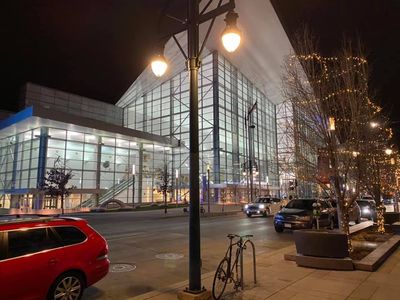Boston University Mathematics goes beyond Boston. In fact, it went to Colorado.
Two Boston University students’ unique experiences with mathematics led them to Colorado.
By Isaac Schorr
In a library in Everett, MA, a fourteen-year-old Alex Rodriguez was completing his math homework when an older man walked up and asked “Hey, can I see your work real quick?”.

Alex let the stranger look at the page he was working on. The stranger examined the page and put it back down on the table.
“You know what? You should study analysis.”
Alex replied that he didn’t know what that meant.
The stranger said he’d be right back and left to another section of the library, returning with three different books about math.
“You need to read these and check them out.”
Alex did just that, and he didn’t stop there. He kept reading.
Roughly 1,500 miles away in Oklahoma, Katie Ragosta was starting to fall into the idea that she wanted to be a theoretical physicist. Realizing that math would be a huge part of her career, she opted to double major in Mathematics and Physics.
Katie “thought that would help [her] be better at physics and… ended up liking math more and then kind of switched tracks.”
While still keeping both majors, Katie decided that math captured more of her interest.
—–
Alex Rodriguez and Katie Ragosta had gotten back nearly a month ago. They were sitting side by side in the basement tutoring room of Boston University’s Mathematics and Statistics Department talking about their time at the Annual Joint Mathematics Meetings that took place 1,770 miles away in Denver, Colorado. Both students talked at the event.
For the past two summers, Kate has done a program called Research Experience for Undergraduates. She described it as similar to “an internship except that you’re doing pure math research most of the time.” Kate had presented the year before and, after getting a lot out of the experience, was excited to go back this year. This year, she talked about her research on curvature invariants, explaining it as something “that can help us study the curvature of surfaces in higher dimensions,” and went on to clarify that “the main reason you would want to do that is because it helps you understand general relativity. It’s also important in a broader geometric context but, for most people, the thing they’re familiar with is general relativity.”
However, there is a lot more to Katie outside of the classroom. “Katie is a very impressive student, extremely nice and interested in helping others,” said Kyle Capogna, an administrator in the Mathematics Department. She tutors on Tuesdays evenings in a math group that meets in West Campus at Rich Hall. Alongside that, Katie serves as a mentor to other undergraduates in the mathematics and statistics peer mentor program. When she’s not helping others, she’s practicing ballet in the studio or playing Dungeons & Dragons with friends. 
Alex had a seat on a panel at the Annual Joint Mathematics Meetings and took the time as an opportunity to talk about his heritage. He, better than most, knows that math is a field as diverse as the people that decide to decipher it. He talked about his background and Costa Rican heritage, saying “I’m coming from a background that’s underrepresented… It’s not often you see someone from my background in math, so I was just there to tell my story about how I got here.” He also talked about
the PROMYS Program that he volunteers for in Boston. PROMYS, which is a six-week program that takes place each summer at Boston University, is a program that puts high school students against challenging math problems. Alex, who was a PROMYS student in 2016, has been a counselor for the past three summers and is expected to return as a head counselor this coming summer. PROMYS also works during the school year to help in math circles at local high schools. Last semester, Katie helped to teach a math program that PROMYS was involved with.
Dr. Li-Mei Lim, an instructor at Boston University, has been the executive director of the PROMYS Program for the last few years. She uses the program to instill a sense of curiosity and work ethic into the students she works with through hands-on experience, saying “the idea of mathematics as an empirical science is important. We learn what is true in math through experience, so I like to encourage exploration whenever I can… When a student is able to do their own numerical experimentation to answer their own questions, that’s a huge success for me. As a PROMYS counselor, Alex encourages this approach to mathematics…”
She believes that the students in the PROMYS programs are “extremely talented high school students, and they come from all over the country, and even the world. It’s important that at PROMYS, everyone is actively engaged in doing mathematics, including the counselors, who are all very strong, motivated math majors.” The multi-layered community allows students to feel welcomed and inspired to pursue mathematics.
Dr. Lim has also been a mentor to Alex in his mathematical career at Boston University, noting Alex as a “mathematical role model” that is excited to help lead this summer’s PROMYS Program. She noted that something that makes the PROMYS Program special is the fact that the counselors are simultaneously engaging with their own mathematical development, modeling for the high school students what it means to really do mathematics.
As they say, math is not a spectator sport.